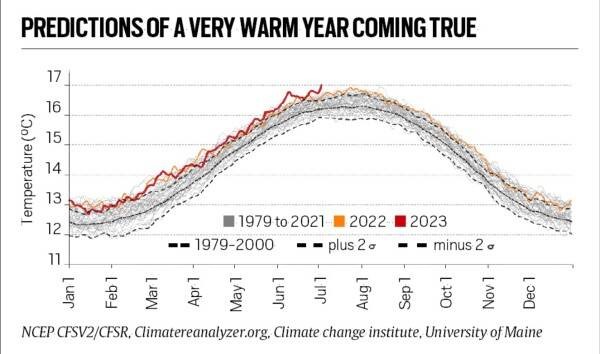Description

Disclaimer: Copyright infringement not intended.
Context
- In more than 125,000 years, the 4th of july 2023 was recorded the hottest day on Planet.
- As per University of Maine’s Climate Change Institute and US National Centers for Environmental Prediction, the global temperature on 4th July was 18 degrees Celsius (62.92 degrees Fahrenheit).
Other Details
- Earlier, a day before on 3rd July, temperature of planet touched a record of 17.01 degrees Celsius (which is 62.62 degrees Fahrenheit).
- It includes both land and ocean; Poles and icesheets.
- The regions from the US south and the north of Africa to China and Antarctica saw occurrence of heat wave.
- In June there are reports of 13 deaths in Texas due to the effect of the heat.

Disclaimer: Copyright infringement not intended.
Methods to estimate average temperature
- Modeling system is used to estimate temperature however it began in the year 1979.
- Scientists use instrument-based global temperature records, tree rings and ice cores to estimate average temperatures of earlier year which can be tens of thousands of years back.
Average temperature around Globe
- Over Oceans: around 21 degree Celsius.
- Antarctic Ice Sheet: -50 degree Celsius is common.
- There are places in deserts which experiences: 40- 50 degree Celsius
Impact of rising temperature
- Ocean Acidification
- Extreme climatic events like floods, droughts, forest fires etc.
- On 4th of July in USA 57 million people were exposed to dangerous heat.
- A risk to increase in the frequency of Heat waves.
- Risk to livelihood and food security.
- Habitation loss especially in coastal areas.
- It accelerates melting of glacier and water level of ocean rises.
Possible reason(s) behind the hottest day
- Human-induced, for eg burning of fossil fuels, climate change.
- Rising temperatures due to other anthropogenic activities.
- Strengthening El Niño weather pattern
Must Read Article:
Recorded warmest years of planet:
https://www.iasgyan.in/daily-current-affairs/past-8-years-warmest-on-record
Heatwaves
https://www.iasgyan.in/daily-current-affairs/heat-waves-36
https://www.iasgyan.in/rstv/heat-waves-and-climate-change
https://www.iasgyan.in/daily-current-affairs/heatwaves
Global warming
https://www.iasgyan.in/daily-current-affairs/state-of-the-global-climate-2022-report
|
El Nino
- El Niño is a weather phenomenon which generally occurs every two to seven years.
- When there is change in wind patterns in the Pacific Ocean – weakening of trade winds.
- This change leads to warm ocean temperatures in the Equatorial Pacific ocean.
- This resulted in flooding in Peru and drought in Indonesia and Australia.
- It is expected to increase global temperatures for the next nine to 12 months as per a report by World Meteorological Organization.
|
|
PRACTICE QUESTION
The hottest day in last 1,25,000 years on earth is recorded on 4th July 2023. Discuss the implications of this. Also elaborate on the possible causes for rising temperature to this level. (150 words)
|

https://indianexpress.com/article/explained/explained-climate/earth-records-hottest-day-ever-causes-what-lies-ahead-8780023















